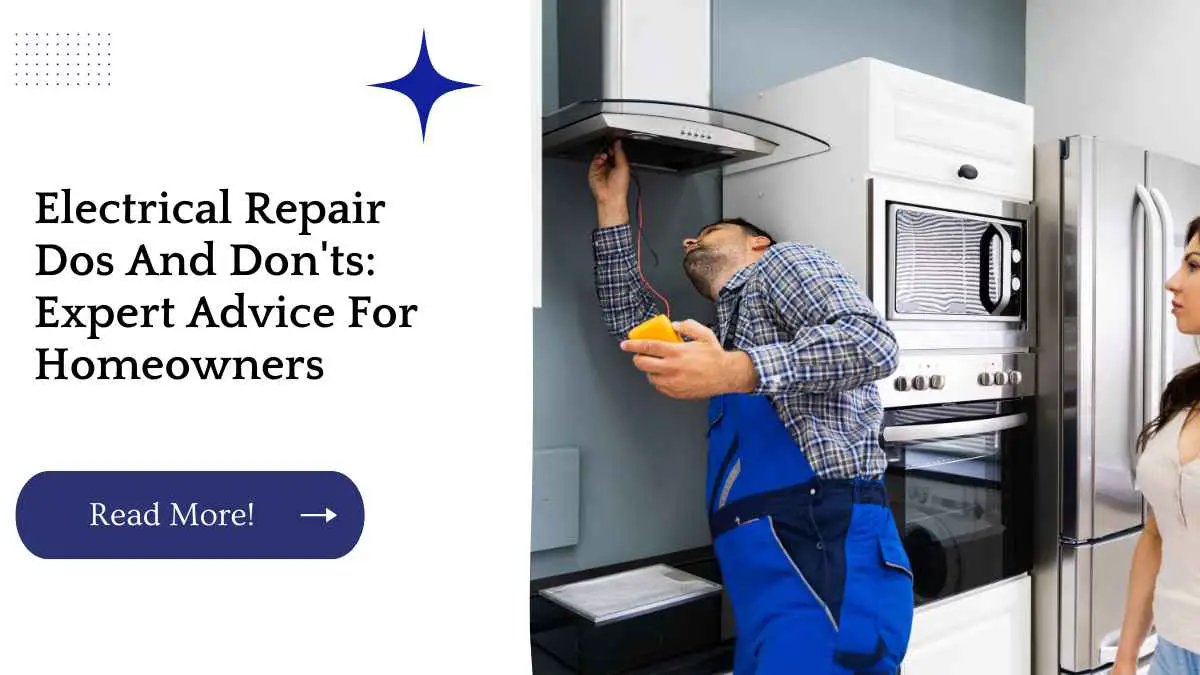Electrical repairs are part of home ownership, but they can be dangerous if you’re not careful. Before you start any electrical repair job, make sure to take these precautions:
| Takeaways |
|---|
| Proper safety measures are crucial for electrical repairs. |
| Following dos and avoiding don’ts ensures a successful repair project. |
| Seek professional help for complex electrical tasks. |
| Regular inspections and maintenance help prevent electrical issues. |
| Understanding electrical safety guidelines protects your home and family. |
Don’t Panic
If you have an electrical problem, don’t panic. Don’t rush to fix it. And don’t get angry. The best thing you can do is take your time, read through the instructions on the tool or product you’re using and make sure that everything is in working order before proceeding with repairs.
If there’s one thing I’ve learned from being an electrician for over 20 years now, it’s this: if something goes wrong with your home’s wiring system–and trust me when I tell you that something will eventually go wrong–you’ll want those power tools nearby so that they’re ready when disaster strikes!
Building a strong foundation of knowledge and following proper safety measures is crucial when it comes to electrical repair. Make sure you’re well-prepared with our comprehensive guide on Electrical Repair Safety Tips to ensure a secure and successful DIY project.
Take Precautions
- Wear gloves and safety glasses.
- Turn off the power before you work on any electrical repair. Use a voltage tester to check for voltage, and don’t work on an appliance if there’s even a chance of live wires being exposed.
- Don’t work on electrical repairs if you are tired or distracted; take care not to make mistakes that can be fatal!
| Precaution | Description |
|---|---|
| Electrical Safety Gear | Wear appropriate safety gear such as gloves and safety glasses. |
| Power Off | Turn off power before working on electrical components. |
| Test for Live Wires | Use voltage testers to ensure wires are not live before handling. |
| Use Circuit Breakers | Install circuit breakers for added protection against electrical faults. |
| Follow Manufacturer Guidelines | Adhere to guidelines provided by equipment manufacturers. |
Call an Electrician for Large Jobs
If you’re tackling a larger electrical job, it’s best to call an electrician. Electrical repairs can be dangerous and even deadly if not done properly. It’s always better to let the pros handle it!
Tackling electrical repairs doesn’t have to be overwhelming, even for the average homeowner. Gain confidence and practical know-how with our straightforward tips outlined in Electrical Repairs Made Easy – 10 Simple Tips for the Average Homeowner. Empower yourself to handle common electrical issues efficiently and effectively.
Buy the Right Materials
When you’re doing electrical repairs, it’s important to buy the right materials. Many homeowners don’t know where to start when it comes to buying electrical parts and tools.
It can be tempting to buy cheap materials or even bypass safety features in order to save money, but this is an unwise decision that could lead to injury or property damage. Here are some tips for buying quality electrical supplies:
- Buy from a reputable supplier with a good reputation for customer service
- Avoid cheap substitutes for name-brand products (like generic batteries) if possible; these may not perform as well as their branded counterparts and may even be unsafe
- If you are unsure about whether something is safe for use in your home, consult an electrician before using it
Avoid common pitfalls and mistakes during electrical repairs by learning from the experiences of others. Discover the most common blunders and how to steer clear of them in our eye-opening article on Electrical Repair Fail – Don’t Make These Common Mistakes.
Learn How to Terminate Wires
When you’re ready to terminate wires, you’ll need a few tools. You’ll want a wire stripper and crimping tool. Wire strippers come in both manual and automatic varieties, so choose the one that best fits your skill level and budget.
The process of stripping insulation from the ends of wires is straightforward: just insert the stripped end into your chosen tool, squeeze down on it until all excess wire has been removed, then twist off any remaining strands with pliers or another type of cutter (such as scissors).
Now that you’ve got your stripped ends ready for connection–and before moving on to connecting them–it’s important to remember how much heat can damage electrical components like circuit boards inside appliances like stoves or ovens!
Be sure not to let sparks fly when soldering by keeping flammable materials away from open flames; also avoid working near sources such as candles because they could ignite easily if exposed accidentally during soldering work sessions at home
| Skill | Description |
|---|---|
| Wire Termination | Master the technique of properly terminating electrical wires. |
| Strip Insulation | Remove the outer insulation from wire ends with precision. |
| Crimp Connectors | Use crimp connectors to securely join wires together. |
| Soldering | Learn the art of soldering for reliable wire connections. |
| Heat Shrink Tubing | Apply heat shrink tubing to protect and insulate wire joints. |
Inspect Your Tools Before Use
You should inspect your tools before use. This will help you avoid damaging them, and it can also save you from injury. Here’s what to look for:
- Loose connections
- Damage to the tool or its accessories (handles, blades)
- Safety features that are missing or broken
- Wear and tear on any moving parts of the tool (for example, if there are cracks in a saw blade) If something looks like it needs repair or replacement, take care of it before using your electrical equipment again!
Enhance your electrical repair skills and become a pro with insider knowledge from industry experts. Uncover the trade secrets and invaluable tips shared in our exclusive article on Electrical Repair Tricks of the Trade – Secrets from the Pros.
Avoid Exposed Wires or Loose Connections
Always avoid working with exposed wires. If you encounter any loose connections, call an electrician immediately.
If you’re going to be doing any electrical repairs in your home, it’s important that you understand how to identify safe working conditions and hazards.
| Hazard | Prevention |
|---|---|
| Exposed Wires | Cover and protect exposed wires using electrical insulation. |
| Loose Connections | Tighten connections and use appropriate fastening devices. |
| Risk of Electrical Shocks | Install ground fault circuit interrupters (GFCIs). |
| Potential Fire Hazards | Regularly inspect and replace damaged electrical components. |
| Safety with Brand Products | Use high-quality electrical products from trusted brands. |
Make Safety First Priority When Working With Electrical Repairs
When you’re working with electrical repairs, safety should be your first priority. Make sure that you are rested and alert when doing this kind of work, and don’t try to do it when there’s an emergency or another pressing issue in your home.
Use the right tools and equipment for the job. If you aren’t sure whether or not something is safe enough for use with electricity, ask an expert before using it–and remember that sometimes even professionals make mistakes!
Be extra careful when using extension cords as well; they can easily short out if they aren’t properly grounded or protected from damage by water or other elements (which brings us back around full circle).
Plan ahead before beginning any project involving electricity: take stock of all components involved (lights? Switches?), identify potential hazards such as exposed wires or frayed wires/cords, etc., then determine exactly where those risks lie within each step of your plan so that none slip through unnoticed later on down the line during construction work itself.”
Electrical repair can be a daunting task, but being aware of potential mishaps and taking preventive measures can save you from potential disasters. Read our gripping article on Electrical Repair Horror Stories – Things That Can Go Wrong and How to Prevent Them to learn from real-life experiences and protect yourself from electrical mishaps.
Conclusion
Electrical repairs can be a bit daunting, but with the right knowledge and tools, you can make the job easier.
If you don’t feel comfortable doing an electrical repair on your own, then it’s best to call an expert who knows what they’re doing. It’s always better safe than sorry when it comes to home repairs!
Further Reading
Here are some additional resources for further reading on electrical safety and home electrical repairs:
Electrical Safety Tips for Homeowners: Discover essential safety tips and guidelines to ensure the well-being of your home and family when dealing with electricity.
How to Do Home Electrical Repairs: Learn step-by-step instructions and practical advice for tackling common electrical repairs in your home, empowering you to handle them confidently.
Electrical Safety Tips for Homeowners: Gain valuable insights and tips to maintain electrical safety in your home, including preventive measures, signs of electrical issues, and when to seek professional help.
FAQs
How can I ensure electrical safety in my home?
Ensuring electrical safety in your home involves taking a few precautionary measures, such as:
- Regularly inspecting electrical cords and outlets for damage.
- Avoiding overloading electrical circuits and outlets.
- Installing ground fault circuit interrupters (GFCIs) in areas prone to moisture.
- Keeping flammable materials away from electrical equipment.
What are some common electrical problems in homes?
Some common electrical problems in homes include:
- Frequent circuit breaker tripping.
- Dimming or flickering lights.
- Power outlets not working.
- Electrical shocks or tingling sensations.
- Burning smells from outlets or switches.
Can I perform electrical repairs myself?
Minor electrical repairs, such as replacing a light switch or a broken outlet, can often be done by homeowners with some knowledge and caution. However, it’s crucial to know your limitations and consult a licensed electrician for complex or potentially hazardous electrical work.
How often should I have my home’s electrical system inspected?
It is recommended to have a professional electrician inspect your home’s electrical system at least once every five years. However, if you notice any signs of electrical issues or if your home is older, more frequent inspections may be necessary.
When should I hire a professional electrician?
It is advisable to hire a professional electrician in the following situations:
- When dealing with major electrical installations or renovations.
- If you’re experiencing recurring electrical problems.
- When there are signs of electrical hazards, such as sparking or burning smells.
- If you’re unsure about the safety or integrity of your home’s electrical system.

Hello, everyone! My name is Hellen James and I’m the founder of Unified Fix. I’ve been a home improvement enthusiast for years, so when we started this blog, I knew that it was important to me that we shared our knowledge with you.

